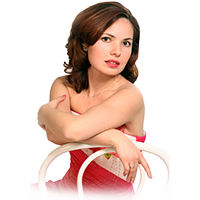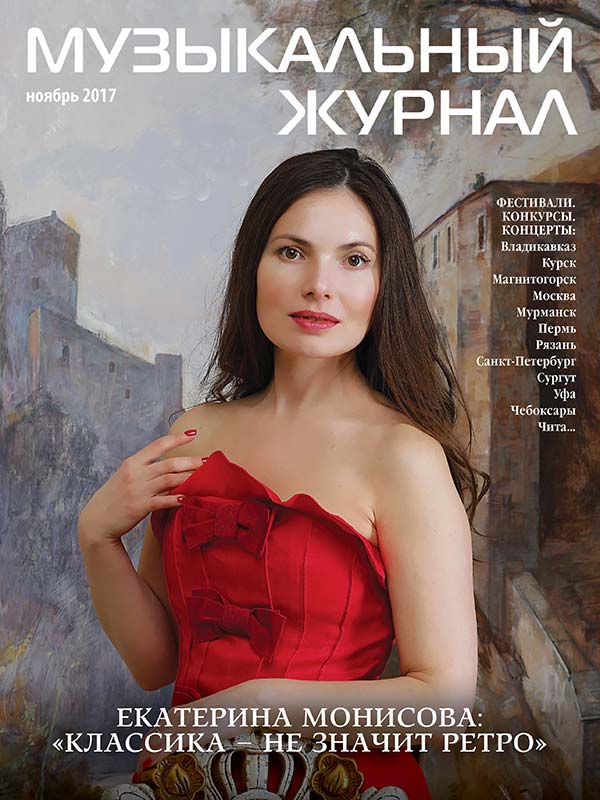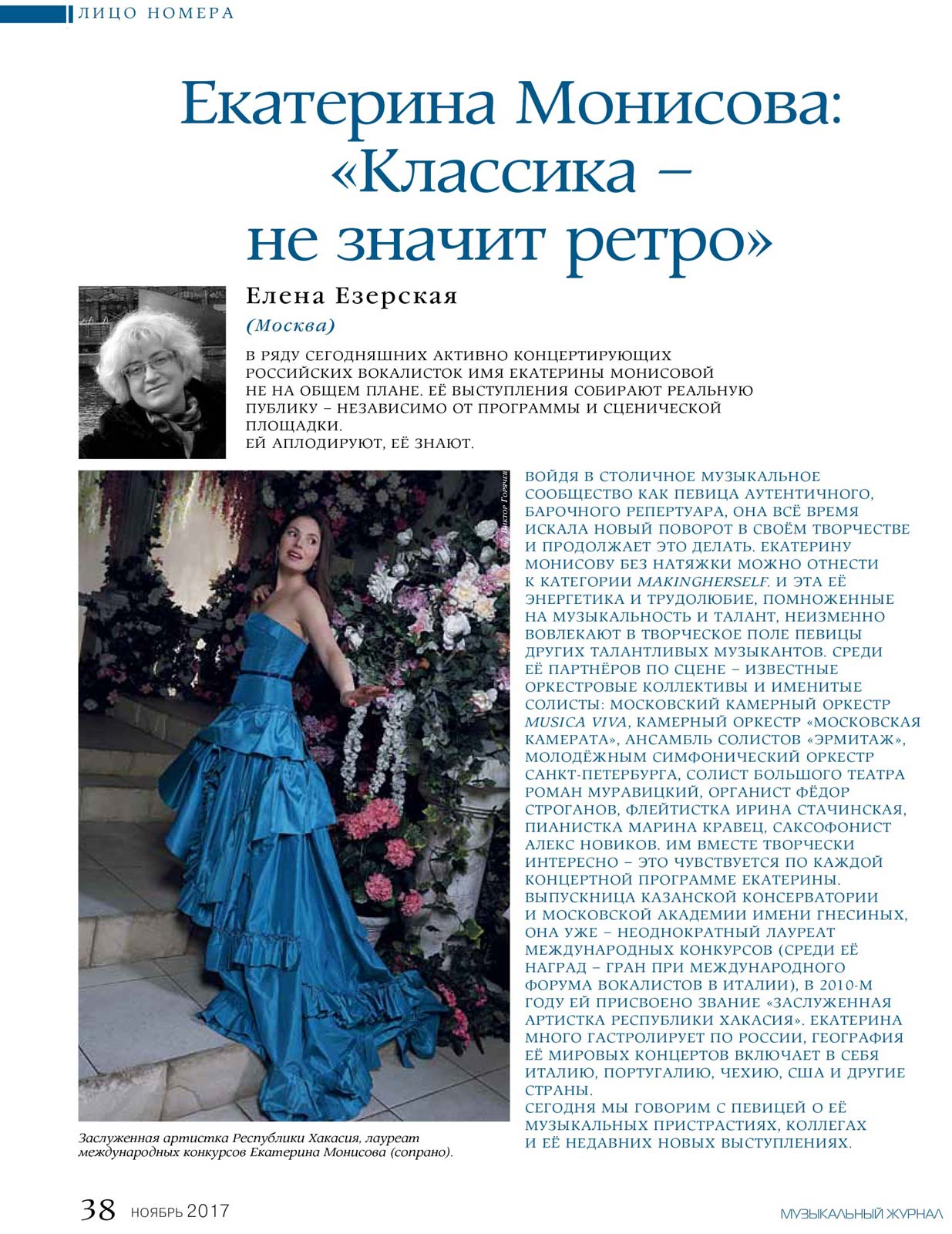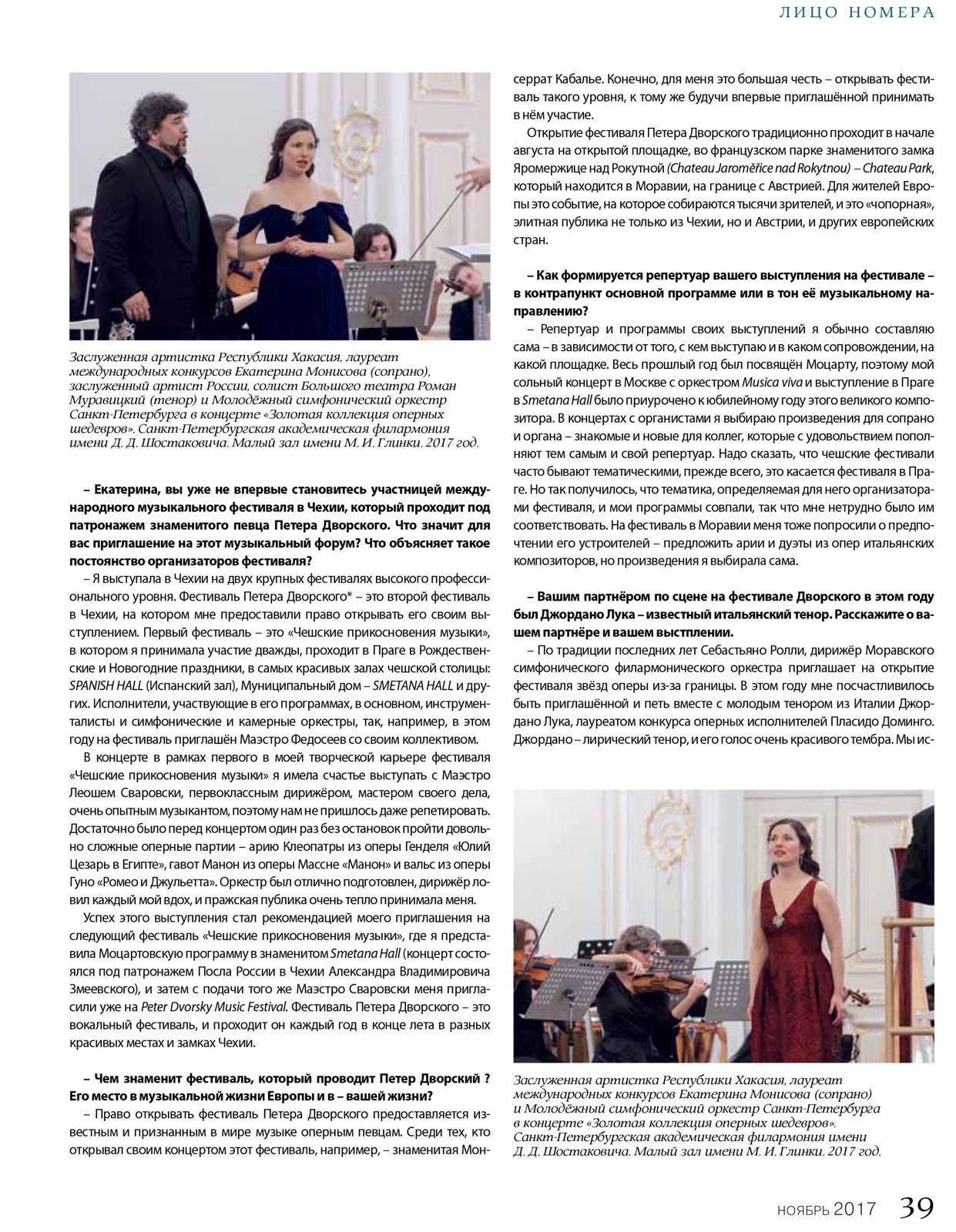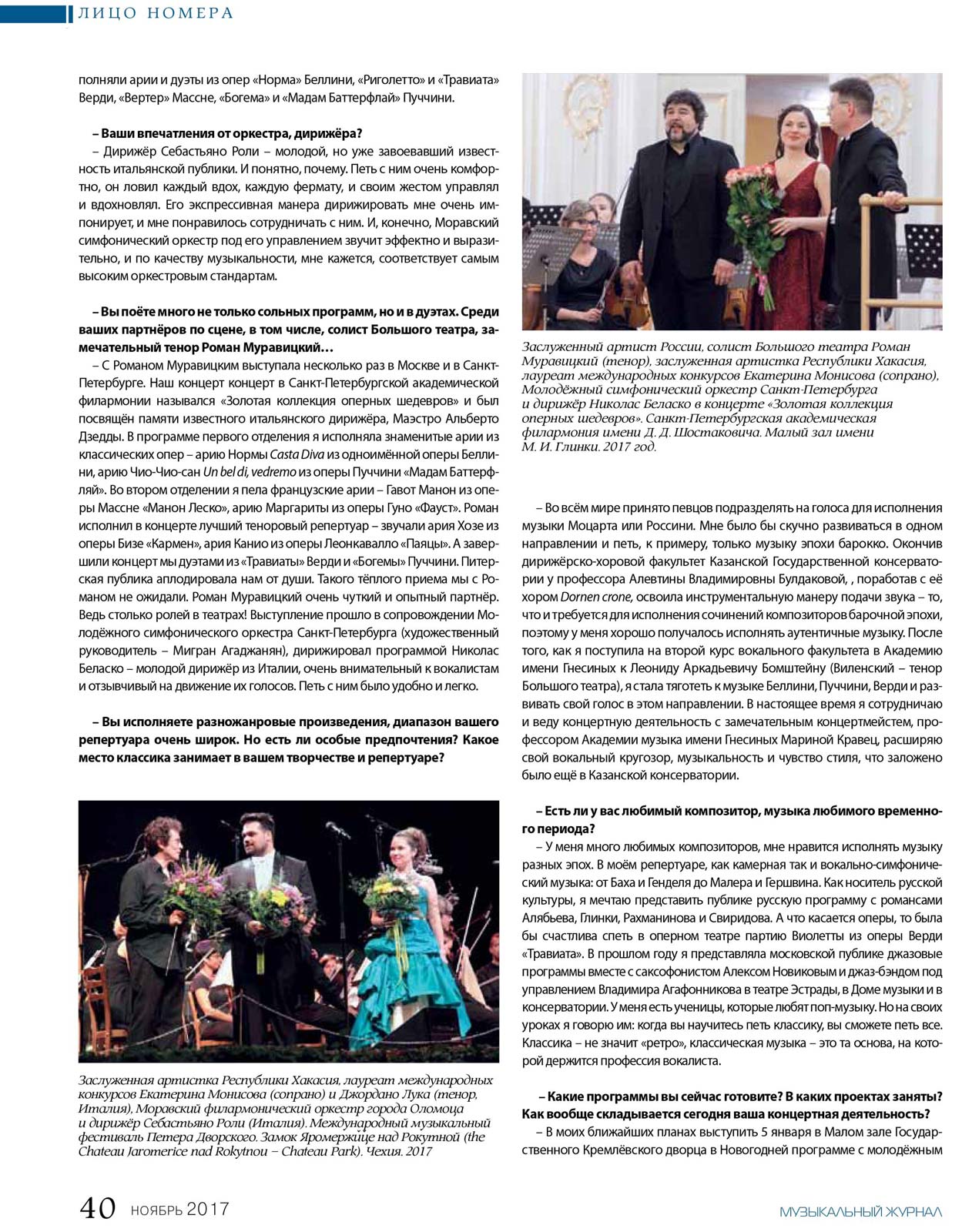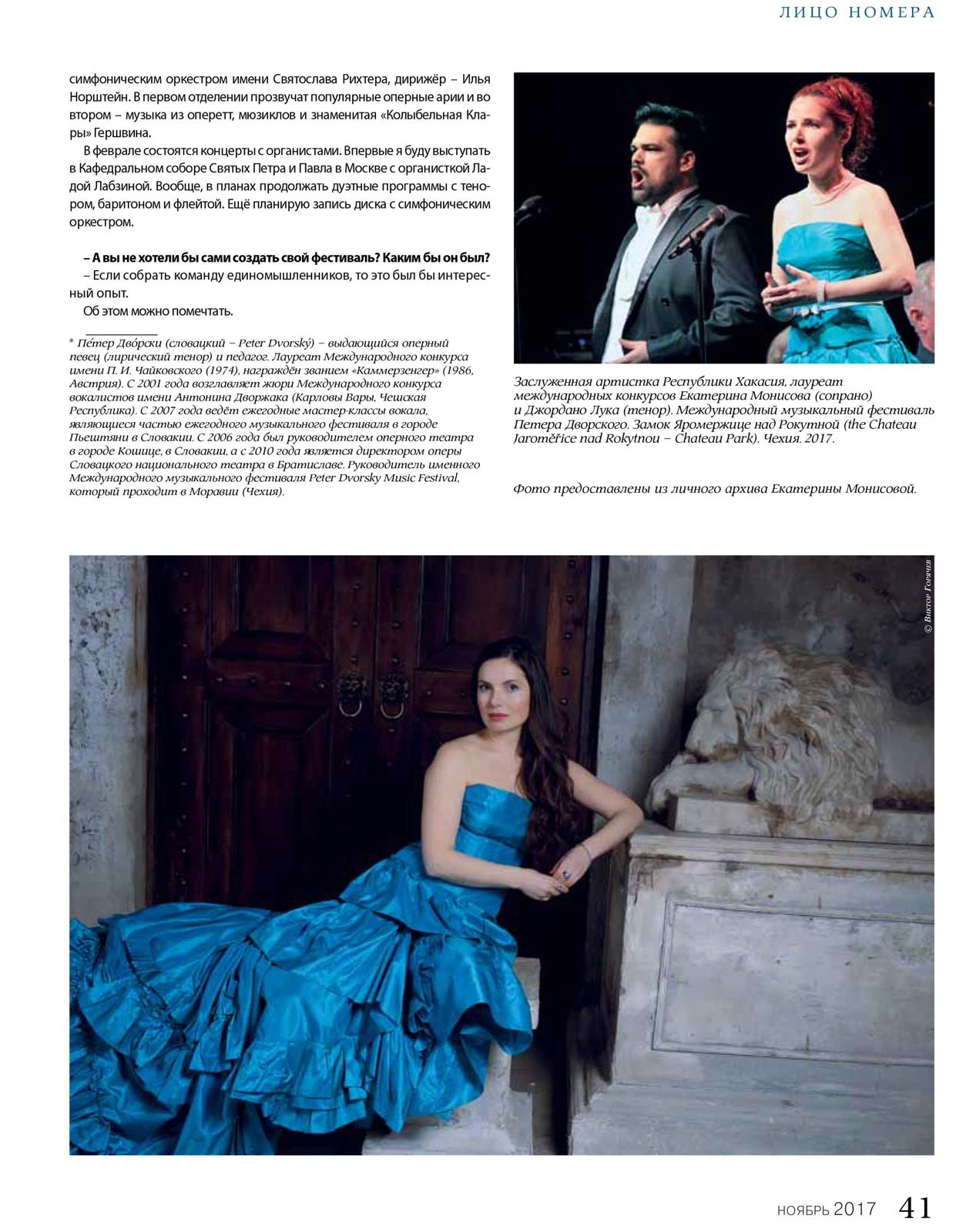"The Music Magazine" November 2017 "Classic doesn’t mean retro"
Soprano Ekaterina Monisova is one of today's actively performing Russian singers. Her recitals attract public without reference to the program or location. She is applauded and well-known. Entering the Moscow musical community as a singer of baroque repertoire she always looking for a new turn of her art.
Undoubtedly she can be attributed to the category of self-made. Her energy and diligence multiplied by talent and musicality involve invariably other gifted musicians in the creative field of the singer. There are a lot of famous orchestras and eminent soloists among her stage partners: Moscow Chamber Orchestra Musica Viva, Moscow Camerata, ensemble of soloists Hermitage, St. Petersburg Youth Symphony Orchestra, the Bolshoi Theatre soloist Roman Muravitsky, organist Fedor Stroganov, flautist Irina Stachinskaya, pianist Marina Kravets, saxophonist Alex Novikov. They are all interested in working together and it is felt in any concert program of Ekaterina.
Graduate of Kazan State Conservatoire and Moscow Gnessin Academy she is a prize-winner of several international competitions and in particular of the International Vocal forum in Italy (Grand prix). She was awarded with the title of Honoured Artist of the Republic of Khakassia in 2010. She is touring a lot in Russia as well as in Italy, Portugal, Czech Republic, USA etc.
We are talking of her musical preferences, colleagues, recent and future performances.
– Ekaterina, you are far from a newcomer at the Czech international music festivals. What does it mean for you and why such a constancy of the festival management?
– I have a chance to participate in two major Czech festivals: my solo recital opened the recent Peter Dvorský* Festival and twice I took part in the festival Czech Music Touches (České doteky hudby). The last one takes place in the most beautiful locations of Prague (such as Spanish Hall or Smetana Hall of Town Council) on Christmas and New Year's holidays. Performers for the most part are instrumentalists, symphonic and chamber orchestras (for example, Maestro Fedoseev with his team this year).
At the Czech Music Touches I had a good fortune to perform with Maestro Leoš Svárovský, first-class conductor, very experienced musician, master of his craft. We did not even have to rehearse! It was enough to run through rather complicated pieces before the concert without stopping. My program contained Cleopatra’s aria from Handel's Giulio Cesare, Manon’s Gavotte from the opera of the same name by Massenet and Juliet Valse from Romeo and Juliet by Gounod. The orchestra was perfectly prepared, the conductor caught each breath I took and the Prague audience welcomed me warmly.
That success was the reason of my invitation to the next Czech Music Touches, where I presented all-Mozart program in the famous Smetana Hall. The concert was held under the patronage of the Ambassador of Russia in the Czech Republic Alexander Zmeevsky. And then I was invited to the Peter Dvorský Music Festival by the initiative of Maestro Svárovský. This vocal-oriented annual festival is held in different beautiful places and castles of Czech at the end of summer.
– What else is famous for the festival of Peter Dvorský and what is its place in the musical life of Europe and in your life?
– The privilege to open this festival is usually granted to well-known and recognized opera singers like the famous Montserrat Caballé, for instance. Of course, it is a great honor to me to open a festival of such level, besides being invited for the first time. The opening by tradition is held at the beginning of August at the open area of the French park of the famous castle Jaroměřice nad Rokytnou which is located in Moravia on the border with Austria. This is rather elite event for European public not only from Czech Republic but also from Austria and other countries.
– How the program of your festival performance was formed?
– I usually make up the repertoire of my recitals by myself depending on concrete situation. It is important to consider where and with whom you sing and with what accompaniment. For example, if say of my organ recitals I choose works for soprano and organ familiar and new to colleagues who gladly fill up their repertoire. Last year was dedicated to Mozart all over the world, so my solo recital in Moscow with Musiсa viva orchestra as well as Prague performance in Smetana Hall was timed to the anniversary of great composer. And in regard to Czech festivals they often are thematic and first of all it concerns Prague festival. But it turned out that festival themes and my own programs coincided in a happy way, so it was not difficult for me to conform. As for the Moravian festival I was asked to select arias and duets from Italian operas by my own choice.
– Your stage partner at the Dvorský Festival was young but already popular Italian tenor Giordano Lucà. Tell please about him and your cooperation.
– According to the tradition of last years the conductor of the Moravian Philharmonic Orchestra Sebastiano Rolli invites opera stars from abroad for the opening gala. I was lucky to sing along with Giordano. He is a lyric tenor of very beautiful timbre and a prize-winner of the Placido Domingo’s Operalia and the BBC Cardiff Singer of the World competitions. We performed arias and duets from Bellini’s Norma, Rigoletto and La Traviata by Verdi, La Boheme and Madama Butterfly by Puccini and Massenet’s Werther.
– What are your impressions of the orchestra and the conductor?
– Sebastiano Rolli is also rather young but already well-known with Italian public. And it is understandable why. To sing with him was very comfortably, he felt every my breath, every fermata. His gesture ruled and inspired. His emotional manner of conducting impressed me very much and I liked to cooperate with him. And, of course, the Moravian Philharmonic Orchestra sounded effectively and expressively under his baton. It was high orchestral standard and perfect quality of musicality.
– You sing a lot in duos and the Bolshoi Theater soloist Roman Muravitsky is among your regular partners...
– Yes, Roman is a remarkable tenor with so many opera roles and very sensitive and experienced partner. We performed together several times in Moscow and in St. Petersburg. Our last recital in the St. Petersburg Philharmony was in memoriam of the Italian conductor and Rossini great expert – Maestro Alberto Zedda. My program of the first section consisted of Casta Diva from Norma and Un bel di vedremo from Madama Butterfly. In the second part I’ve sang some French arias such as Gavotte of Manon and Margarita’s Jewel Song from Faust by Gounod. As for Roman he has performed the best tenor repertoire: Flower Song from Carmen of Bizet and aria of Canio Recitar!... Vesti la giubba from Leoncavallo’s I Pagliacci. We completed our homage with duets from La Traviata and La Boheme and didn’t even expect such a warm reception from the Petersburg audience. We were accompanied by the Youth Symphony Orchestra of St. Petersburg (Artistic Director – Migran Agadzhanyan), conducted by Nicholas Belasco, a young Italian conductor, very attentive to vocalists and responsive to the voice movements. Singing with him was convenient and easy.
– You have to perform music of so different genres and the range of your repertoire is so wide. But are there any special preferences? What place does the classic take in your life?
– Singers all over the world are divided into voice categories for performance of music of a certain category: Baroque either Mozart, Rossini, Verdi, verismo, modern etc. I would be bored to develop only in one single direction in order to sing, for instance, only Baroque music. Having graduated from Kazan State Conservatory as a choral conductor with Professor Alevtina Vladimirovna Buldakova and especially after working in her chorus of Dornenkrone I’ve mastered the technique of instrumental sound which is required for the performance of the Baroque works in the authentic manner and could do it well. But I began to gravitate towards the music of Bellini, Verdi and Puccini and developed my voice in this direction with my new professor, the Bolshoi Theatre tenor Leonid Bomshtein-Vilensky during my Gnessin years. Currently collaborate and perform with a wonderful pianist-accompanist, Gnessin’s professor Marina Kravets. Try to expand my vocal horizons, musicality and sense of style.
– Who is your favorite among composers and what kind of music do you prefer?
– I have a lot of favorite composers and like to perform music of different epochs. I have both chamber and vocal-symphonic music from Bach and Händel to Mahler and Gershwin in my repertoire. As a representative of Russian culture hope to introduce the public all-Russian program of songs by Alyabyev, Glinka, Rachmaninov and Sviridov. And as for the opera it would be lucky to sing Verdi's La Traviata somewhere on the stage. Together with saxophonist Alex Novikov and Vladimir Agafonnikov band I’ve presented some jazz programs to Moscow audience in the Variety Theatre, the House of Music and in the Conservatory last year. My vocal students fond of pop music therefore I always tell them: when you know how to sing classic you able to sing everything. Classic doesn’t mean retro, it’s the basis of our vocal profession.
– What programs or projects are you working on?
– My closest plan is the New Year’s gala in the Small Hall of the State Kremlin Palace on January, 5 with the Svyatoslav Richter Youth Symphony Orchestra under the baton of Ilya Norshtein. There are popular opera arias in the first section and some pieces from operettas, musicals and such evergreens as Summer Time from Porgy and Bess by Gershwin in the second. Then I have several organ recitals in February and looking forward to my debut with organist Lada Labzina in the Cathedral of Saints Peter and Paul in Moscow. As well as new duet programs with tenor, baritone and flute and recording sessions for new CD release with orchestra.
– Would you like to create your own festival as many other singers do?
– If you succeed to assemble a team of like-minded people then it would be an interesting experience. Let’s dream about it.
Interview – Elena EZERSKAYA.
* Peter Dvorský is an outstanding Slovak opera singer (tenor) and vocal teacher. Prize-winner of the Tchaikovsky International Contest in Moscow (1974), Kammersänger (1986, Austria). The head of Antonín Dvořák International contest of young singers (Karlovy Vary, Czech Republic) since 2001. He has been hold annual master classes as a part of the Music Festival in the city Piešťany in Slovakia since 2007. The Head of the Opera in the city of Košice in Slovakia since 2006 and the Chief of the Opera department of the Slovak National Theater in Bratislava since 2010. The Head of the International Peter Dvorský Music Festival in Moravia.


